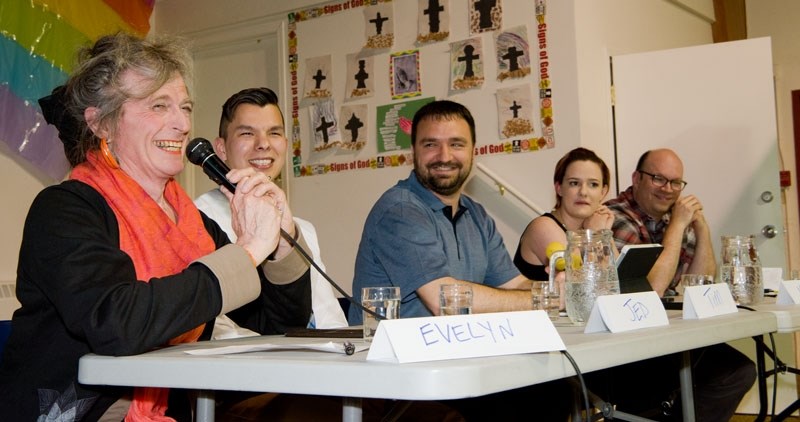By Kevin Ma
The terms "trans" and "transgender" didn't exist when Evelyn Porter was growing up. All she knew is that she felt very different and alone, and that she was living with a lot of anger, blame and repression.
She didn't come out as female until she was 50, and even then the cost was tremendous.
"I lost my family, lost my job, lost my home, everything," she said in an interview.
There's a lot more tolerance of lesbian, gay, bisexual, transgender, and queer persons today, but we're a long way from acceptance, she said.
Porter, who now regularly speaks on LGBTQ issues, was one of five panellists at a public forum Wednesday at the St. Albert United Church on how to create a more inclusive community. About 35 people, including Mayor Nolan Crouse and St. Albert MLAs Marie Renaud and Trevor Horne, attended.
The talk is part of the church's ongoing efforts to support the LGBTQ community, said Betty Mackey, one of the organizers.
"We're all people together. There shouldn't be distinctions made that cause them to feel left out and isolated simply because of who they are."
LGBTQ persons are often considered an invisible minority, said panellist Kristopher Wells, director of the University of Alberta's Institute for Sexual Minority Studies and Services. They're a culturally distinct group that very often doesn't feel safe to express itself in public.
Bellerose student and human rights activist Mia Soetaert said she encounters many visitors to her school's QSA (Queer-Straight Alliance) who feel they have to hide their attendance from their parents.
"It shouldn't be something that's so taboo or so wrong that they can't tell their parents."
But there have been significant and rapid improvements in recent years, said Jed Johns, a gay man and member of the Sucker Creek First Nation. Whereas his friends were stymied when they tried to find a venue for their same-sex marriage five years ago, he was able to plan his own wedding more recently without the venue owner batting an eye. Communities like Edmonton and St. Albert now go to great lengths to ensure all groups feel safe and included.
"I can be myself without having to fear anything."
Wells cited religious fundamentalism and parental conflict as the two biggest barriers to inclusion when it came to the LGBTQ community. He said his phone rings virtually every week with reports of youths who are thrown out of their homes for coming out of the closet.
"My message for parents is very simple: you love your child for who they are or you will lose them," he said, either through estrangement or suicide.
Another problem is attitudes in the health-care system, Soetaert said.
"The mental health-care system I think is just utterly insane," she said, eliciting a chuckle from the audience.
She's had psychologists more or less brush her off when she had contemplated suicide, and tell her parents that "being bi was the flavour of the week nowadays."
"That honestly isn't something you want to hear from a health-care professional."
Role models would help, but many are too afraid to come out of the closet, Wells said. That's why it's important for people outside the LGBTQ community to act as champions and speak on their behalf.
"We need them to lead."
Wells said Edmonton Oilers player Andrew Ference was a great example, marching in the Edmonton Pride Parade with his jersey on and getting his team to become the first in the NHL to use the rainbow-coloured Pride Tape on their sticks.
"Now, one of those sticks is sitting in the Hockey Hall of Fame."
You don't have to be a super-activist either to be an ally, Soetaert said – just listening to youth and getting educated about LGBTQ issues helps.
In addition to calling out people who use terms such as "gay" as an insult, the panellists called on people, especially leaders, to show support for the LGBTQ community by coming out to pride festivals.
Wells called for legislative changes, such as require gender-neutral bathrooms under the building code and including more than two genders on census forms.
"That's how we change culture."




